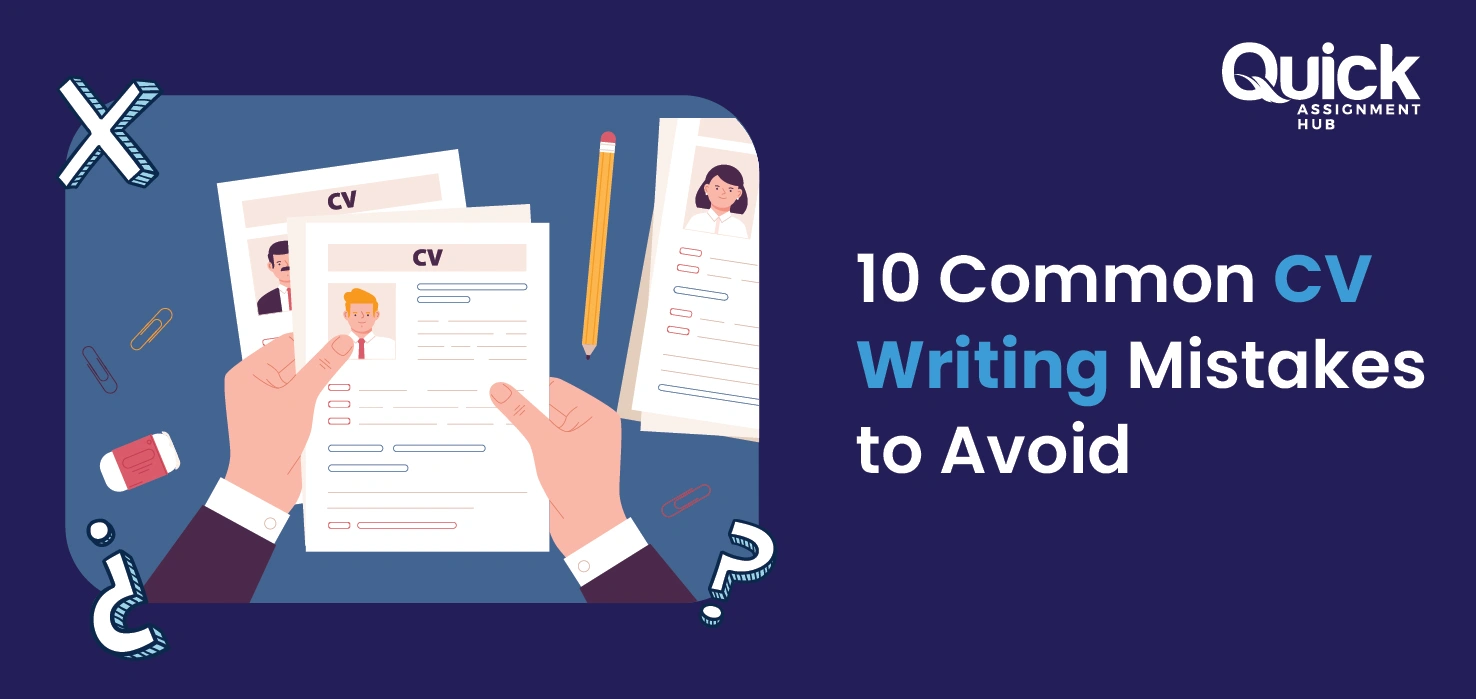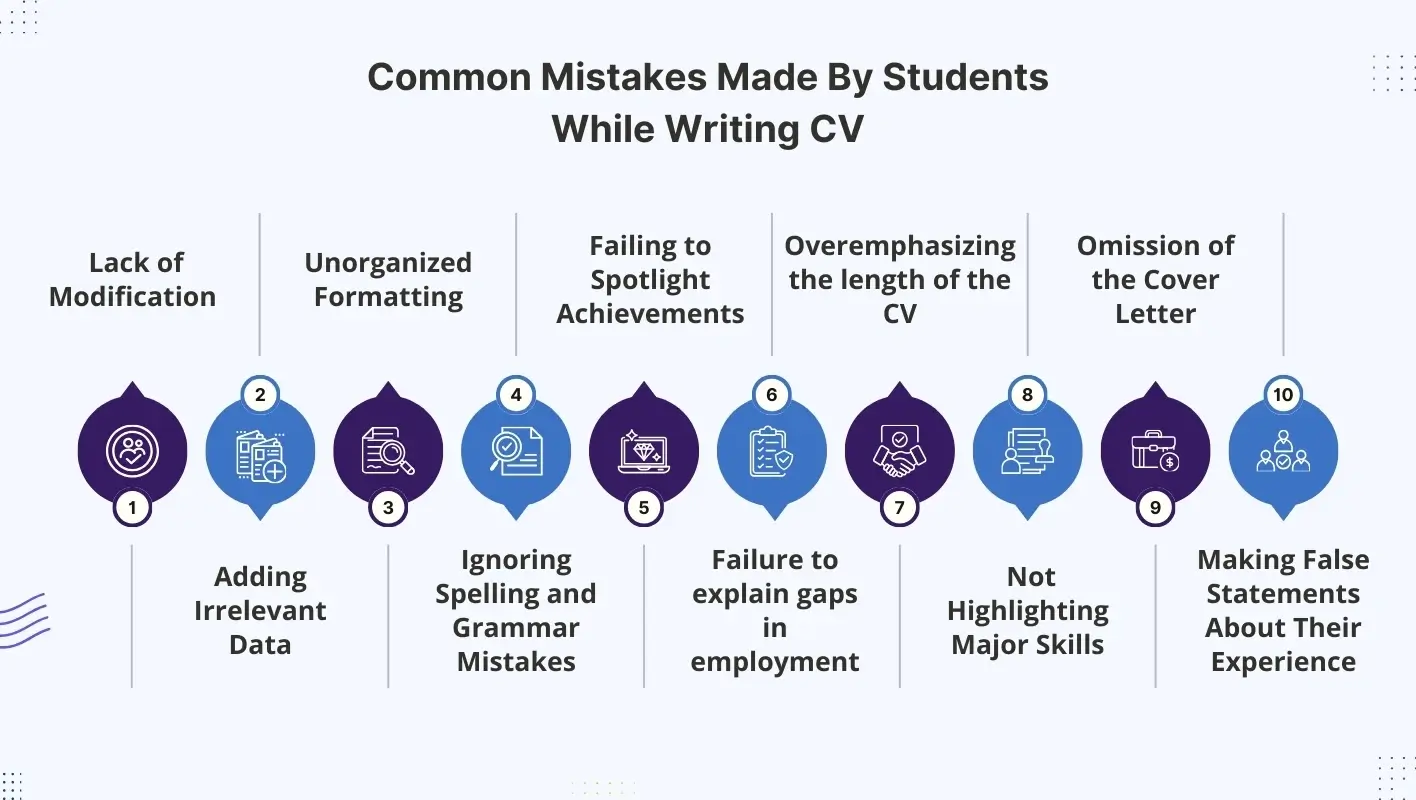
Are you struggling to stand out your CV from others? Well, it is not too hard to make your CV shine in a crowd. There are some of the common mistakes in CV writing every student should keep in mind.
Even a highly qualified candidate gets rejected if they fall into the CV mistakes and miss the chance to get their dream job. So, in this blog, we will learn about 10 CV writing mistakes to avoid and their solution to make the best CV that grabs all attention. Let's begin with it!

One of the CV writing mistakes that a lot of candidates face is the need for more variation in their CVs when applying for a position. Some candidates think that general knowledge is enough and thus prepare a plain CV that will not meet the requirements of the employer or the position.
Solution: Adapt each CV you submit for the particular job you are applying for. It is crucial to study the company and read through the job description to determine what they seek in the candidates. Customizing your CV shows a genuine interest in the post and an effort to create a relevant application.
Some candidates fill their CVs with information that may not be relevant to the job they are applying for, for instance, old qualifications or interests that may not add value to the application.
Solution: Major in the past achievements, training, and employment history that are pertinent to the line of work. If you just applied for a marketing position in a company, the employer does not need to hear about an art award you received in high school.
Spelling mistakes, wrong use of grammar, and punctuation are some of the most basic mistakes job seekers make while writing their CVs. Such mistakes may provide a perception of ignorance or a lack of time and effort to revise your application.
Solution: Every time you write your CV, go for a proofreading exercise. Spell-check the document, but do not solely depend on the spell check option. Find a professional to review your CV for you. Having someone else review your work is always good because they might catch mistakes you fail to notice.
Some CVs should be structured based on the job description instead of accomplishments. Listing what you were accountable for is also crucial, but this does not explain how you obtained value in the earlier positions.
Solution: Focus on the achievements and explain how you helped your prior employers achieve the desired results. For instance, instead of writing that you “supervised a team,” you could write, "supervised a team of 10 employees" and enhanced their productivity by 20% in 6 months. Where possible, include quantifiable experiences that employers can easily understand.
Long-term employment gaps may attract employers' attention if they need to be properly explained. Regarding the employment gaps, employers may prefer to know if you were jobless for ages for negative reasons.
Solution: If you have breaks in your employment history, be sure to be prepared and ready to answer them. In your cover letter or CV, briefly state why you might have a gap in between employment. It could be childbearing, travelling, studying, or even sickness.
Recommended for you: A Guideline On Academic CV Writing From Examples To Templates
Your First Order
Get 20% OFF!
They also do not specify the number of pages a CV should have, but going too short or too extensive has a negative impact. A one-pager is unlikely to represent a candidate in depth, whereas a five-page CV is likely to inundate the reader.
Solution: As a rule, your CV should be one and a half to two pages in length, depending on your working experience. Provide adequate information about yourself and your experience without being too wordy.
While applying for jobs, candidates may be inclined to ignore transferable skills, especially in cases of job transitions. Such skills are sometimes just as important as pure professionalism but may easily be neglected when preparing a CV.
Solution: Find out if some competencies from your past duties will be relevant in the new job despite being in a different company or line of work. Leadership skills, interpersonal and written communications, planning and organizing time, and the ability to solve problems are relevant across fields.
Some candidates do not submit a cover letter because they think the CV is enough for an interview. However, it is much more common for employers to expect applicants to include one as part of the submission.
Solution: Exclude a cover letter only if the job application does not allow one to be submitted for the position. A good cover letter is a chance to introduce yourself, address gaps in your CV, and show interest in the position. Ensure the cover letter is adjusted to the specific job and organization to complete the CV.
Some candidates may be tempted to stretch their resumes to enhance the possibility of the offer. This can range from overemphasizing job positions to protracting employment periods or listing skills they do not possess.
Solution: Being truthful about our qualifications and experiences is always important. Sometimes, employers can notice such problems, and even if you have been hired, you might fail to do your best due to fraud.
Your CV is one of the most important documents during your job search, and avoiding common mistakes may significantly increase your chances of being invited for an interview. Always ensure you reread your CV before submitting it for a particular job, and you will be ready.
Moreover, you can also get professional help to avoid the common mistakes in CV writing. Quick Assignment Hub is right here for the students. So, contact us today and get the best CV for your job opportunities.
You may also like: Top CV Examples & Writing Tips: How To Avoid Common Mistakes!